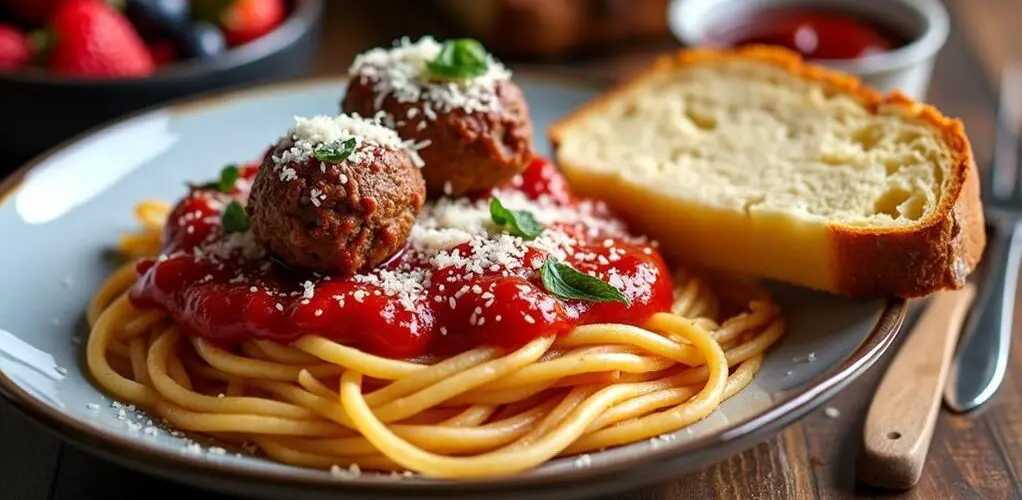
On a ketogenic diet, it is essential to avoid foods that are high in carbohydrates to maintain ketosis. Refined carbohydrates such as white bread, pasta, and rice can spike blood sugar and insulin levels. Sugary beverages and high-sugar fruits like bananas and grapes should also be avoided. Sweeteners such as honey and agave are high in carbs, while processed foods, which often contain hidden sugars and starches, can hinder ketosis. Starchy vegetables like potatoes and corn, and high-carb snacks such as chips and granola bars, can quickly disrupt fat-burning processes. Explore further to understand how to sustain an effective keto diet.
Key Takeaways
- Avoid white bread due to its high carbohydrate content (13g carbs/slice).
- High sugar beverages like Coca-Cola (39g carbs/12 oz) disrupt ketosis.
- Starchy vegetables, such as potatoes (30g carbs/medium potato), are high in carbs.
- Sweet fruits like bananas and grapes contain over 20g of net carbs per serving.
- Processed foods often contain hidden sugars and refined carbohydrates, hindering ketosis success.
Refined Carbohydrates
Refined carbohydrates, such as white bread, pasta, and rice, pose significant challenges for individuals adhering to a ketogenic diet due to their high carbohydrate content.
White sandwich bread contains approximately 13 grams of carbohydrates per slice, making it difficult for those on a keto plan to maintain the low-carb intake necessary to sustain ketosis. Similarly, cooked white pasta and rice contribute about 33 grams and 26.5 grams of carbohydrates per cup and half-cup, respectively, further complicating the maintenance of ketosis.
The impact on ketosis is profound, as the ingestion of refined carbohydrates can rapidly raise blood sugar levels. These spikes in blood sugar not only disrupt the metabolic state required for ketosis but also lead to increased insulin secretion, which can impede the body's ability to burn fat efficiently. This is why avoiding refined carbohydrates is essential for anyone serious about maintaining ketosis.
Consequently, individuals on a ketogenic diet must be vigilant about avoiding such foods.
Alternatives like mashed cauliflower or low-carb bread made from eggs and nuts can provide keto-friendly substitutes while keeping carbohydrate counts low.
Sugary Beverages
Sugary beverages, such as Coca-Cola and fruit juices, are laden with high amounts of carbohydrates that can quickly disrupt ketosis, with a single 12-ounce can containing up to 39 grams of carbs.
For those adhering to a keto diet, it is essential to avoid these drinks and opt for healthier alternatives like water, herbal teas, or sparkling water with natural flavors.
While sugar-free sodas may seem like a viable option, they should be consumed cautiously, as some may still impact blood sugar levels.
High Sugar Content
One of the key elements to maintaining a successful ketogenic diet is avoiding high sugar content beverages. Sugary beverages, such as Coca-Cola, contain approximately 39 grams of carbohydrates per 12-ounce can, a quantity that can greatly disrupt ketosis. This high carb content highlights the necessity of scrutinizing beverage labels closely for hidden sugars.
Fruit juices, often perceived as healthy, can also lead to high carbohydrate intake due to their natural sugar content, making them unsuitable for a keto diet. Even seemingly healthy drinks, such as flavored waters and sports drinks, can be deceptive; many contain added sugars that raise their carb counts. As a result, it is important to read beverage labels meticulously to identify these hidden sugars.
While sugar-free sodas might appear to be a safe option, they can still contain hidden carbs and artificial sweeteners that may impact blood sugar levels. For this reason, they should be consumed in moderation.
Opting for beverages like water, herbal teas, or infused water can provide necessary hydration without compromising ketosis. Accordingly, understanding and managing the high sugar content in beverages is fundamental for anyone committed to a ketogenic lifestyle.
Better Drink Alternatives
Maintaining ketosis while guaranteeing adequate hydration demands careful selection of beverages. Sugary beverages such as Coca-Cola, containing roughly 39g of carbs per 12-ounce can, can swiftly derail ketosis. Additionally, fruit juices, despite their healthy image, often exceed 25g of carbohydrates per cup due to natural sugars, making them unsuitable for a keto diet. For those seeking hydration options that align with a low-carb lifestyle, it's vital to take into account alternatives that do not disrupt ketosis.
Sugar-free sodas may be consumed in moderation, but monitoring individual responses to sugar alcohols is essential, as they can impact carb counts. Ideal hydration can be achieved through zero-carb options like water, herbal teas, and infused water. Sparkling water with natural flavors presents a invigorating, carb-free alternative to sugary drinks.
Here is a comparison of various hydration options:Beverage TypeCarbohydrate Content (per serving)Keto-Friendly?
Coca-Cola (12 oz) 39g No Orange Juice (1 cup) 25g No Sugar-Free Soda (12 oz) 0g (varies with sugar alcohols) Yes (in moderation) Water 0g Yes Sparkling Water 0g YesChoosing these low carb beverages guarantees hydration without compromising ketosis.
Sweeteners
When steering through the keto diet, understanding the impact of various sweeteners on ketosis is paramount. Certain sweeteners, particularly those high in carbohydrates, can greatly disrupt ketosis.
Concentrated sugars such as honey and syrups like agave and maple are prime examples; honey contains approximately 17g of carbs per tablespoon, while maple syrup contains about 13g per tablespoon. These sweeteners can spike blood sugar levels, making them unsuitable for maintaining ketosis. Additionally, sweeteners like maltodextrin also have a high glycemic index and should be avoided.
Instead, opting for natural alternatives such as stevia and erythritol is advisable. These sweeteners are lower in carbs and less likely to affect blood sugar levels, thereby making them more compatible with a keto diet.
To navigate sweetener choices effectively, consider the following:
- Avoid concentrated sugars: Honey, agave syrup, and maple syrup should be avoided due to their high carbohydrate content.
- Choose natural alternatives: Stevia and erythritol are preferable for their lower carb content.
- Be cautious with sugar-free products: They may contain hidden carbs, so always read labels carefully.
- Monitor sugar alcohols: These can still affect blood sugar despite being lower in carbohydrates.
- Avoid artificial sweeteners: Though carb-free, they can have other health impacts and may not be ideal for a keto diet.
High Carb Snacks
Steering through a keto diet involves more than just choosing the right sweeteners; it's equally important to be vigilant about high-carb snacks. High-carb snacks can quickly derail your ketogenic efforts due to their significant carbohydrate content. For instance, potato chips, a popular snack, contain approximately 14g of net carbs per ounce, which can easily exceed daily carb limits. Similarly, crackers made from refined grains often contain over 20g of carbs per serving, undermining ketosis.
Popcorn is another common snack that should be consumed with caution; even one cup can contain around 6g of carbs. Trail mix, especially those containing dried fruits, is another culprit, with carb content often exceeding 12g per ounce due to the concentrated sugars. Granola bars, while marketed as healthy, can have over 20g of carbs per bar, making them unsuitable for a keto diet.
| Snack TypeApproximate Carb Content (per serving) | |
|---|---|
| Potato Chips | 14g net carbs per ounce |
| Crackers | 20g+ carbs per serving |
| Popcorn | 6g carbs per cup |
| Trail Mix | 12g+ carbs per ounce |
| Granola Bars | 20g+ carbs per bar |
To maintain your ketogenic state, consider keto friendly alternatives and practice snack portion control.
Starchy Vegetables
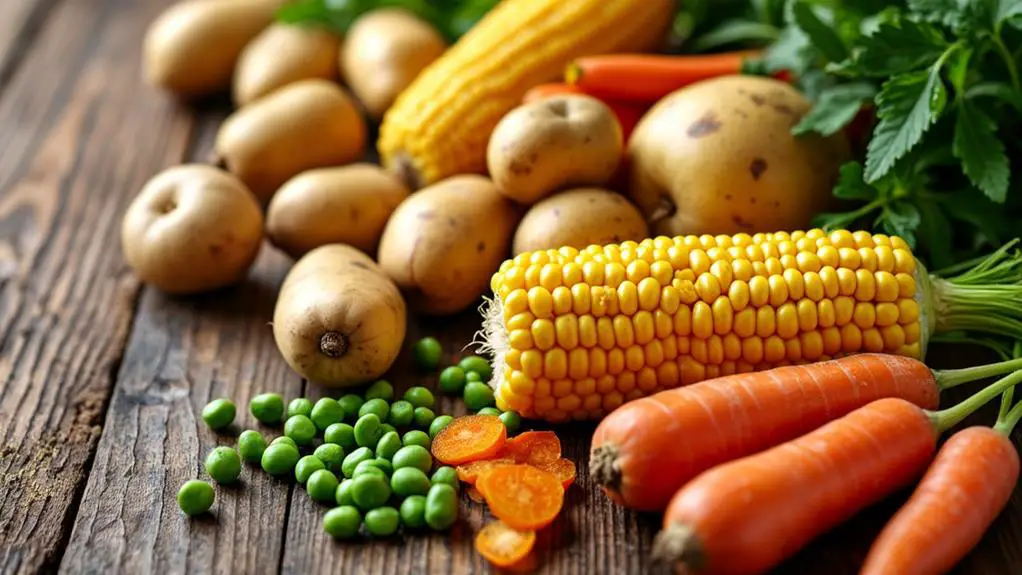
Starchy Vegetables
Steering through the complexities of a ketogenic diet necessitates a careful examination of vegetable choices, especially when it comes to starchy vegetables. Importantly, starchy vegetables such as potatoes, sweet potatoes, corn, and peas are high in carbohydrates, which can disrupt ketosis—a metabolic state fundamental to the keto diet's efficacy.
Starchy vegetables are also lower in fiber compared to non-starchy vegetables, which are essential for maintaining digestive health on a keto diet.
Consider the following carbohydrate contents:
- Potatoes: Over 30g of carbs per medium potato
- Sweet potatoes: Approximately 20g of carbs per medium potato
- Corn: About 27g of carbs per cup
- Peas: Around 12g of net carbs per cup
These carbohydrate levels are significant, as maintaining ketosis typically requires limiting daily carb intake to about 20-50 grams. As a result, the inclusion of starchy vegetables can easily exceed this limit, making them unsuitable for a ketogenic diet.
Fortunately, there are keto alternatives that provide similar nutritional benefits without jeopardizing ketosis. Vegetables such as cauliflower and broccoli are low in carbs and rich in essential nutrients.
Opting for these keto-friendly alternatives not only supports metabolic goals but also guarantees a balanced intake of vitamins and minerals essential for overall health. Ultimately, a meticulous selection of vegetables is vital for successfully adhering to a ketogenic diet.
Certain Fruits
Certain Fruits
Maneuvering a ketogenic diet requires a keen understanding of which fruits align with its low-carb principles. While fruits are generally perceived as healthy, certain varieties can jeopardize ketosis due to their high sugar content.
For instance, bananas, grapes, and mangoes can each contain over 20 grams of net carbs per serving, making them unsuitable for a keto diet. Similarly, dried fruits like raisins and Medjool dates are particularly problematic; a single Medjool date contains approximately 18 grams of carbs, reflecting their concentrated sugars.
High-carb fruits can also lead to disrupting ketosis and hindering fat loss due to increased blood sugar levels. Even seemingly modest fruits such as apples and oranges exceed keto carb limits. A medium apple, for instance, contains around 25 grams of carbs, while a medium orange has about 15 grams.
Consuming such high-carb fruits can quickly disrupt ketosis and hinder weight loss efforts. Consequently, high-carb fruits should be avoided or consumed in very small portions.
Instead, lower-carb fruit alternatives, known as keto friendly fruits, are preferable. Berries, such as raspberries and strawberries, are excellent choices due to their lower carbohydrate content.
For example, a quarter cup of raspberries has only about 1.7 grams of net carbs, making them a more suitable option within keto-friendly fruit serving sizes.
Processed Foods
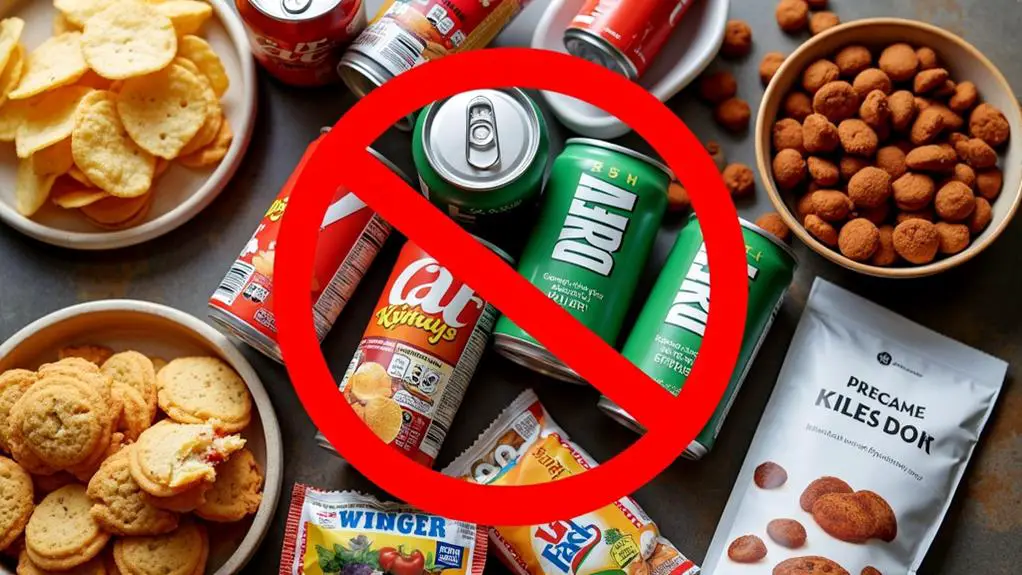
Steering through a ketogenic diet necessitates vigilance in avoiding processed foods, which often harbor hidden sugars and refined carbohydrates that can disrupt ketosis.
Processed snacks such as granola bars and low-fat products frequently contain added sugars, contributing to higher carb counts unsuitable for keto adherence.
Furthermore, frozen meals and ready-to-eat options often include starchy vegetables and grains, further elevating carbohydrate content.
To maintain ketosis, it is essential to read labels carefully, as even products marketed as healthy can be misleading.
High fructose corn syrup and other hidden carbs are common culprits that hinder keto success.
This can lead to harmful blood sugar spikes and disrupt metabolic health.
For instance, deli meats like honey-baked ham may contain approximately 7.3 grams of net carbs per serving due to added sugars and fillers.
Here are some processed foods to avoid:
- Granola bars and low-fat snacks
- Frozen meals with starchy vegetables and grains
- Ready-to-eat options with hidden carbs
- Deli meats with added sugars or fillers
- Products containing high fructose corn syrup
Opting for healthy alternatives such as fresh vegetables, unprocessed meats, and whole foods can help guarantee adherence to the ketogenic diet while promoting overall health.
Frequently Asked Questions
What Foods Can You Not Eat on Keto?
To maintain ketosis, avoid high carb vegetables, sugary foods, and certain fruits. Be cautious with hidden sugars in processed foods, alcohol choices, and meal prepping. Opt for keto friendly snacks, fruits, and use sugar substitutes. Track macros diligently.
What Are the Golden Rules of Keto?
The golden rules of keto include limiting carbohydrates to 20-50 grams per day, prioritizing high-fat, whole, unprocessed foods, and moderate protein intake. Common mistakes and keto misconceptions often involve hidden sugars and inaccurate macronutrient tracking.
What Are the Top 10 Keto Foods?
The top 10 keto foods include fatty cuts of meat, low-carb vegetables, high-fat dairy, nuts, seeds, and berries in moderation. Additionally, keto snacks and keto desserts like cheese crisps and avocado chocolate mousse are ideal choices.
What Foods Do Not Break Ketosis?
Foods that do not break ketosis include high-fat meats, low-carb vegetables like kale and spinach, and keto-friendly snacks such as macadamia nuts. Full-fat dairy products and sugar-free sweeteners like stevia are also suitable options.
Conclusion
Adherence to a ketogenic diet necessitates the exclusion of refined carbohydrates, sugary beverages, sweeteners, high-carb snacks, starchy vegetables, certain fruits, and processed foods. These items considerably impede the maintenance of ketosis due to their high carbohydrate content. By eliminating these foods, individuals can better sustain the metabolic state that characterizes the ketogenic diet, thereby optimizing the potential health benefits associated with reduced carbohydrate intake, such as improved weight management and enhanced metabolic health.
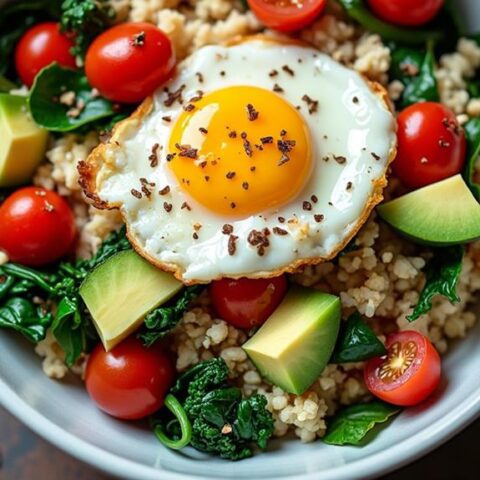


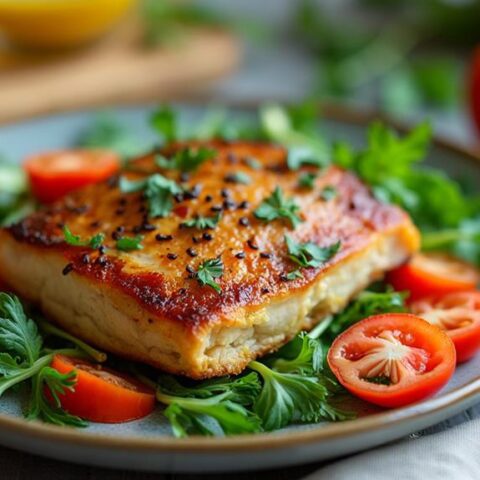

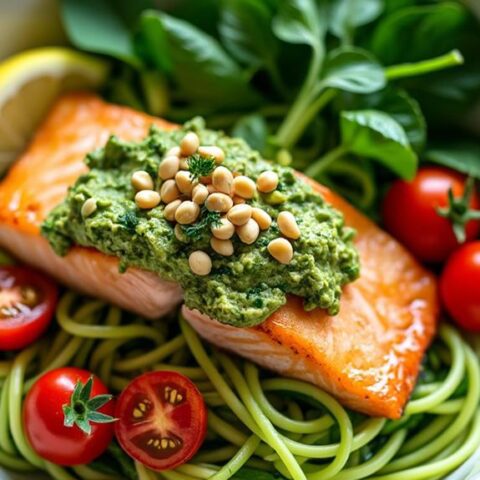




No Comments